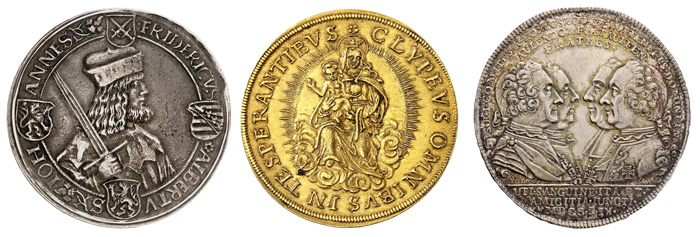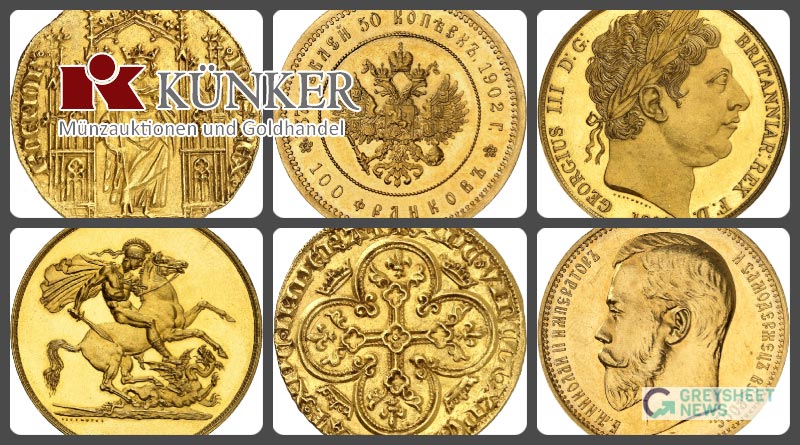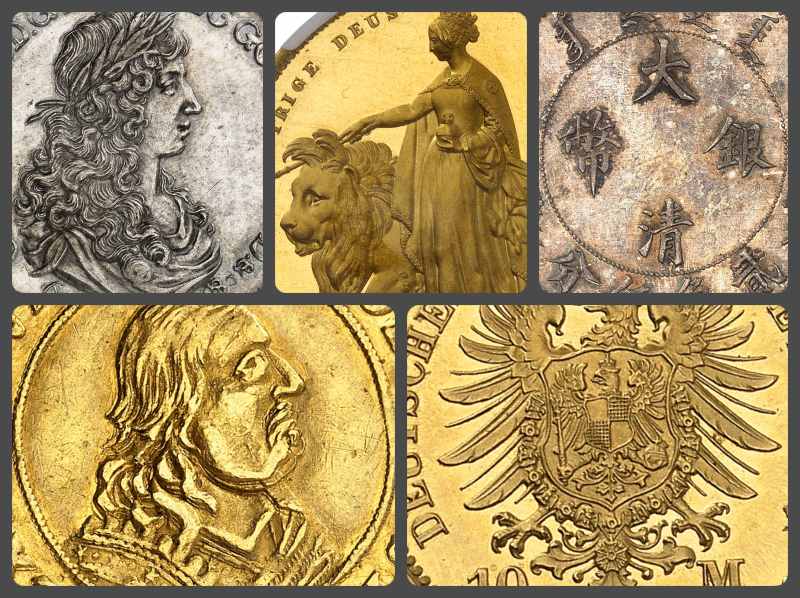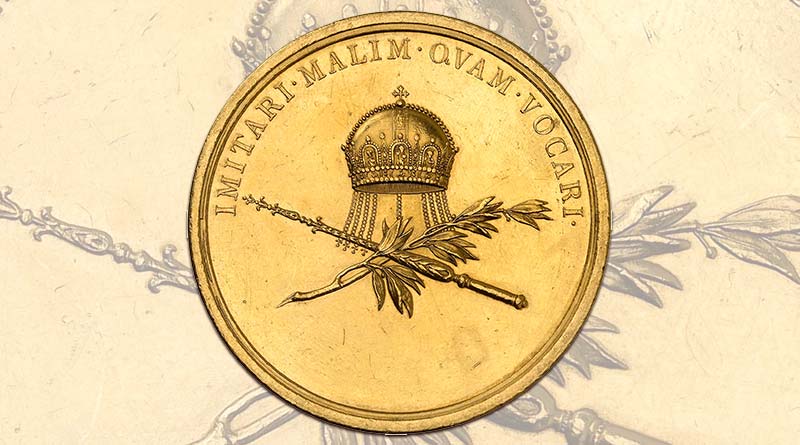The Köhlmoos Collection at Künker
Time to make a note in your calendar: Künker’s January Auction Sales 2022 will take place on Wednesday instead of Thursday, and in Osnabrück instead of Berlin. Several collections will be on offer, including the second Köhlmoos Collection of the usual legendary quality.
Time to make a note in your calendar: Künker’s January Auction Sales 2022 will take place on Wednesday instead of Thursday, and in Osnabrück instead of Berlin. Several collections will be on offer, including the second Köhlmoos Collection of the usual legendary quality.
It was one of the great highlights in the history of the legendary Münzen und Medaillen AG to auction off the Annemarie and Gerd Köhlmoos Collection in 2001. The wealth of rarities and the quality of the offered talers exceeded everything that even the most experienced dealers had encountered in their lifetime. Most of the pieces on offer were the best known specimens of the respective coin type – regardless of whether they were minted in the 16th or 19th century.
At the time, the successful entrepreneurial couple sold their joint collection in order to finance a robot-assisted production plant in Rotenburg an der Wümme for their company JUWEL-Aquarium. Immediately thereafter, the two began to assemble a second collection. Now, the coins from the German States of this second collection will enter the market, once again to finance a new production plant, which is intended to make the leader in the field of aquaristics independent of non-European suppliers. And – as one would expect – the coins of this collection are of incredible quality.
The Köhlmoos Collection is only one of many highlights of the two auction sales 358 and 359, which will be held on Wednesday, 26 January 2022 in Osnabrück. Save the date and note the venue in your calendar! Due to the current health situation, Künker decided not to hold the January Auction Sales as part of the World Money Fair as they usually do.
Both auctions 358 and 359 comprise a varied offer of top quality with great rarities, especially from the German States. These include selected lösers from the Friedrich Popken Collection, gold issues from Bavaria and numerous rarities.
Moreover, on 1 and 2 February 2022, another part of the collection of a connoisseur will be on offer. eLive Premium Auction 360 contains about 900 lots, mainly with German coins minted between the Middle Ages and the 19th century.
Catalog 358: German Coins – Highlights from the Annemarie and Gerd Köhlmoos Collection
From Anhalt to Würzburg, from Romanesque bracteates to representative issues from the Renaissance and impressive talers of the Baroque period to the purist coinage of the Enlightenment: this is the wide range of coins gathered in the Köhlmoos Collection.
The name stands for quality – just like the first Köhlmoos Collection, the second one, which was assembled by Annemarie and Gerd Köhlmoos between 2001 and 2020, is characterized by pieces of quality and an eye for excellent engravings. It goes without saying that great rarities are also part of the collection. At this point, we will only mention three of them: a taler by John of Küstrin, minted in 1545 in Krossen (estimate: 40,000 euros), a taler of Ferdinand of Bavaria as Bishop of Paderborn, minted in 1620 in Brakel (estimate: 50,000 euros) and a taler of Frederick I of Schleswig-Holstein, Denmark and Norway, minted in 1522 in Husum (estimate: 50,000 euros).
In addition to talers, the collection also includes extremely rare fractional pieces, i.e. half talers, quarter talers, two thirds talers and dicken.
Lovers of medieval coins should also take a close look at this collection because it contains extremely rare and interesting bracteates of the highest quality. At this point we will mention a bracteate by Albert the Bear for his Margraviate of Brandenburg (estimate: 10,000 euros), a bracteate by Conrad of Wettin, minted in Meißen for the Margraviate of Meißen (estimate: 6,000 euros) and a bracteate by Louis III of Thuringia, minted in Gotha (estimate: 7,500 euros).
And that’s enough: it is better to use pictures than words to illustrate the exquisite works of art that the Köhlmoos Collection has in store for all those who appreciate high-quality issues.
No. 21: Bentheim. Ernst Wilhelm, 1643-1693. Reichstaler 1659, Münster. Extremely rare. About extremely fine. Estimate: 30,000 euros
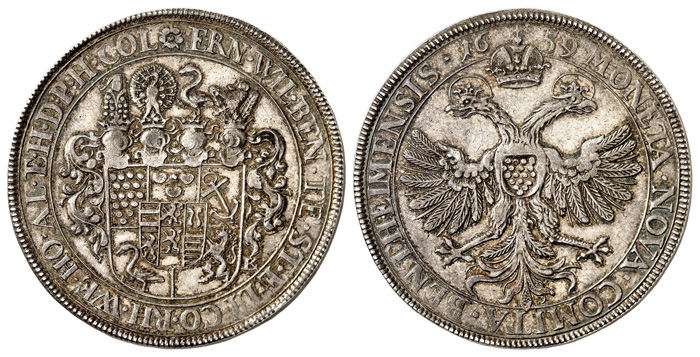
No. 31: Brandenburg. Albert the Bear, 1134-1157. Bracteate, Wegeleben,
Ballenstedt or Aschersleben. Specimen from the “Herzoglich-Anhaltische
Münzsammlung” of Dessau (from the Freckleben hoard), Adolph E. Cahn auction
70 (1931), No. 9. Extremely rare. About FDC. Estimate: 10,000 euros
No. 34: Brandenburg. John of Küstrin, 1535-1571. Taler 1545, Krossen. Very rare. Very fine to extremely fine. Estimate: 40,000 euros
No. 137: Nuremberg. Guldengroschen 1528. Extremely rare. Extremely fine. Estimate: 30,000 euros
No. 151: Paderborn / Diocese. Ferdinand of Bavaria, 1618-1650. Reichstaler 1620, Brakel. Extremely rare, the only specimen on the market. Extremely fine. Estimate: 50,000 euros
No. 167: Palatine – Zweibrücken – Veldenz. John I, 1569-1604. Reichstaler n. d., Zweibrücken. Very rare. Extremely fine. Estimate: 25,000 euros
No. 180: Meißen. Conrad the Great of Wettin, 1127-1156. Bracteate, Meißen. Very rare. About FDC. Estimate: 6,000 euros
No. 182: Saxony. Frederick III the Wise, Albert and John, 1486-1500. Taler n. d., Annaberg or Wittenberg. First klappmünzentaler. Very rare. Very fine. Estimate: 20,000 euros
No. 223: Schleswig-Holstein / Royal Danish territory. Frederick I, 1490-1523-1533. Taler 1522, Husum. So-called Husum taler. Extremely rare. Very fine to extremely fine. Estimate: 50,000 euros
No. 238: Thuringia. Ludwig III, 1172-1190. Bracteate, Gotha. Very rare. Extremely fine to FDC. Estimate: 7,500 euros
No. 245: Württemberg. Eberhard III, 1633-1674. Reichstaler 1640, Stuttgart. Very rare. Extremely fine. Estimate: 20,000 euros
Catalog 359: Gold Issues from Bavaria
Auction 359 begins with 63 lots of magnificent Bavarian gold coins and medals from an Upper Bavarian private collection from Staffelsee. The issues cover the time frame from William V to “the Fairy Tale King” Ludwig II. Connoisseurs will discover rare guldens, ducats and multiple gold coins of the Renaissance period, magnificent commemorative issues from the Baroque era, river gold, medals and much more. The collection is not only of interest to those who are enthusiastic about Bavarian numismatics: since Bavarian history was closely connected with Austrian history, collectors of Habsburg coinage should also study the offer carefully.
No. 304: Bavaria. Maximilian I, 1598-1651. 6 ducats 1627, Munich. Off-metal strike from the dies of the half reichstaler. Extremely rare, second known specimen in private possession. Extremely fine. Estimate: 25,000 euros
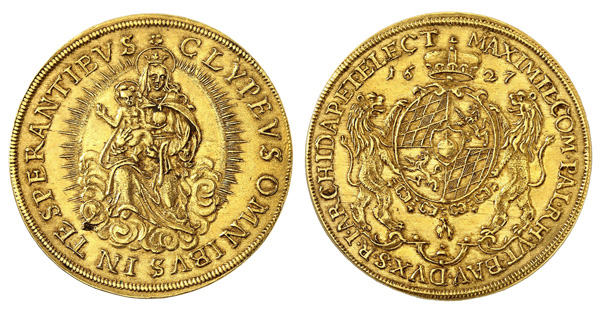 No. 312: Bavaria. Maximilian II Emanuel, 1679-1726. 5 ducats n.d. (1685),
Munich. Gift of the Bavarian “Landesstände” (regional states) for his
wedding with Maria Antonia, daughter of Leopold I of Austria. Very rare.
Extremely fine / Extremely fine to FDC. Estimate: 15,000 euros
No. 312: Bavaria. Maximilian II Emanuel, 1679-1726. 5 ducats n.d. (1685),
Munich. Gift of the Bavarian “Landesstände” (regional states) for his
wedding with Maria Antonia, daughter of Leopold I of Austria. Very rare.
Extremely fine / Extremely fine to FDC. Estimate: 15,000 euros
No. 320: Bavaria. Maximilian III Joseph, 1745-1777. Gold medal of 10 ducats 1765 by A. Widemann commemorating the wedding of his sister Josepha with Emperor Joseph II of Austria. Very rare. Extremely fine to FDC. Estimate: 10,000 euros
No. 339: Bavaria. Maximilian (I) IV Joseph, 1799-1806-1825. Off-metal strike in gold of 5 ducats from the dies of the ½ “schulpreistaler” (school token) n.d. (minted until 1837). Extremely rare. About FDC. Estimate: 30,000 euros
Catalog 359: Selected Lösers from the Friedrich Popken Collection
In catalog 359, another part of lösers from the Friedrich Popken Collection will be on offer. Everyone who closely followed Künker’s last auction sales will know that this is an impressively diverse collection with numerous rarities. This time, 38 lots will be offered. Two lösers will be highlighted here: a Julius löser of 10 reichstalers, minted in 1578 in Heinrichstadt (Wolfenbüttel), and a löser of 6 reichstalers of 1634 minted from the silver of the St Jacob mine.
No. 365: Brunswick-Wolfenbüttel. Julius, 1568-1589. Löser of 10 reichstalers 1578, Heinrichstadt (Wolfenbüttel), minted with the dies of the löser of 5 reichstalers. Extremely rare. Very fine. Estimate: 20,000 euros
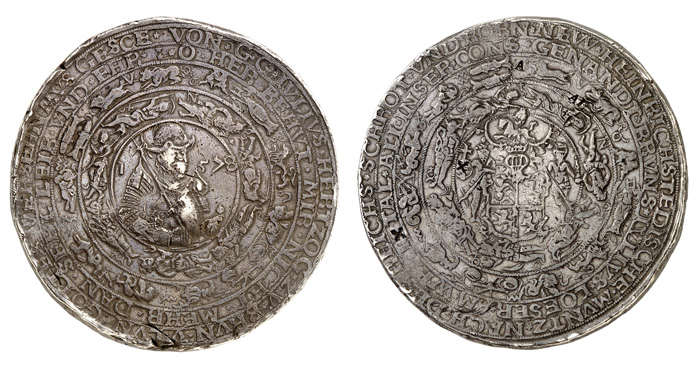
No. 371: Brunswick-Wolfenbüttel. Frederick Ulrich, 1613-1634. Löser of 4
reichstalers 1617, Goslar or Zellerfeld. Very rare. Very fine to extremely
fine. Estimate: 7,500 euros
Auction 359: Coins and Medals from Medieval and Modern Times
As every year, the January Auction Sales offer both very special collections and rare individual pieces from all over the world. Although there are some lots in the lower four-digit range on offer, this auction focuses on the heavyweights of numismatics. If you are looking for a diverse offer of coins in the high price range, this auction is for you.
Let us mention a few specific examples: a speciestaler by Frederick the Great, minted in 1755 in Berlin (estimate: 60,000 euros), a gold löser of 20 ducats, minted on behalf of Christian the Elder, Duke of Brunswick and Lüneburg, Administrator of Minden (estimate: 300,000 euros), a triple real of the city of Cologne, minted with the dies of the guldengroschen (estimate: 75,000 euros), a six-fold ducat of the Passau bishop Joseph Dominikus von Lamberg, minted in 1753 for his golden jubilee of priesthood (estimate: 100,000 euros), and an 18-fold ducat of Johann Georg I, minted in 1627 in Dresden (estimate: 125,000 euros).
The section of Habsburg coinage also contains a considerable amount of multiple gold coins of the kind minted by Emperors to be used as gifts, for example a 10-fold ducat by Ferdinand II, minted in 1632 in St Veit (estimate: 75,000 euros) or a 10-fold ducat of Ferdinand III, minted in 1657 in Breslau (estimate: 150,000 euros).
Among the 137 lots with world coins and medals, you will find numerous selected rarities. We will mention a gold medal of 20 ducats issued on the occasion of the bombardment of Copenhagen in the Great Northern War (estimate: 50,000 euros), an eightfold Louis d’or à la tête laurée, minted by Louis XIII in 1640 in Paris (estimate: 100,000 euros), a Proof Una and the Lion (estimate: 80,000 euros), a Russian gold coin with the portrait of Nicholas II, minted according to the weight standard of the Latin Monetary Union of 1902 (estimate: 80,000 euros), and a 10-fold ducat of the Transylvanian Prince Stephan Bocskai, minted in 1605 (estimate: 100,000 euros).
For lovers of Swiss coinage there is an extensive offer of multiple gold coins from Basel, Bern and Lucerne. And collectors of interwar-Czechoslovakian coins can look forward to an extensive series of these coins that also contains great rarities.
Auction 359 ends with a small, fine selection of eight lots with orders and decorations. The outstanding piece is a specimen of the Order of the Black Eagle, created during the reign of Frederick William IV, awarded to Lieutenant General Ernst von Pfuel (1779-1864) on 18 January 1844 in a private audience.
No. 441: Brandenburg-Prussia. Frederick II, 1740-1786. Speciestaler 1755, Berlin. Trading coin. Extremely rare. About FDC. Estimate: 60,000 euros
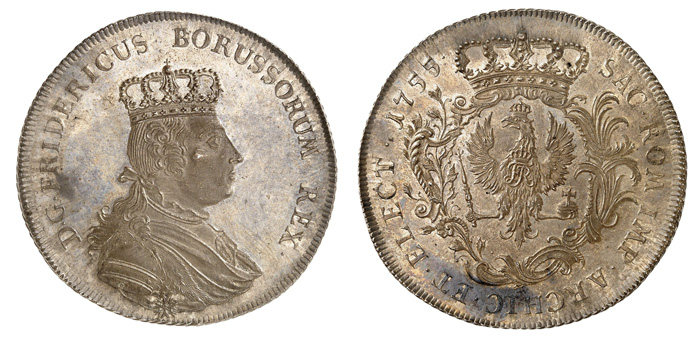
No. 450: Brunswick-Lüneburg-Celle. Christian, 1611-1633. Gold löser of 20
ducats n.d. (1611-1633), Winsen. Extremely rare, probably unique. NGC AU55.
About extremely fine. Estimate: 300,000 euros
No. 505: Cologne. Triple real 1516, minted with the dies of the guldengroschen. Extremely rare. Very fine to extremely fine. Estimate: 75,000 euros
No. 541: Passau. Joseph Dominikus von Lamberg, 1723-1761. 6 ducats 1753, Vienna, on his golden jubilee of priesthood. Very rare. Extremely fine. Estimate: 100,000 euros
No. 550: Saxony. John George I, 1615-1656. 18 ducats 1627, Dresden. Minted with the dies of the double reichstaler. Only known specimen. Graffiti with face value XVIII on the obverse. Extremely fine +. Estimate: 125,000 euros
No. 620: HRE. Ferdinand II, 1592-1618-1637. 10 ducats 1632, St Veit. Extremely rare. Extremely fine. Estimate: 75,000 euros
No. 625: HRE. Ferdinand III, 1625-1637-1657. 10 ducats 1657, Breslau. Extremely rare. NGC MS62. Extremely fine to FDC. Estimate: 150,000 euros
No. 668: Denmark. Frederik IV, 1699-1730. Gold medal of 20 ducats 1700, unsigned, probably minted in Hamburg, commemorating the siege and bombardment of Tönning by Danish troops in 1700 and the siege and bombardment of Copenhagen by Swedish, English and Dutch fleets in 1700. Extremely rare. NGC MS62. Extremely fine to FDC. Estimate: 50,000 euros
No. 671: France. Louis XIII, 1610-1643. Huit louis d’or à la tête laurée 1640, Paris. NGC AU50. Extremely rare. About extremely fine. Estimate: 100,000 euros
No. 683: Great Britain. Victoria, 1837-1901. 5 Pounds 1839, London. Una and the Lion. Very rare. Proof. Estimate: 80,000 euros
No. 741: Russia. Nicholas II, 1894-1917. 37 ½ roubles (100 francs) 1902, St Petersburg. Only 225 specimens minted. About FDC. Estimate: 80,000 euros
No. 750: Switzerland. Basel. 12 ducats n.d. (first half of the 17th century). Probably the 2nd known specimen. PCGS MS61. Extremely fine. Estimate: 100,000 euros
No. 785: Czechoslovakia. 10 ducats 1934, Kremnica, commemorating the re-opening of the Kremnica mine. Original strike. Only 68 specimens minted. About FDC. Estimate: 20,000 euros
No. 793: Transylvania. Stephan Bocskai, 1604-1606. 10 ducats 1605. Very rare. NGC AU55. About extremely fine. Estimate: 100,000 euros
No. 804: Prussia. Order of the Black Eagle. Golden chain without jewel, 2nd edition, 2nd version (1847). II-III. Estimate: 100,000 euros
Catalog 360: Coins and Medals from Medieval and Modern Times of Outstanding Quality – The Collection of a Connoisseur
On 1 and 2 February 2022, eLive Premium Auction 360 offers a wealth of coins of perfect quality with starting prices from 10 euros. From the Carolingian period to the German Empire, the “connoisseur” assembled an extensive collection, paying particular attention to quality. Therefore, coin enthusiasts will find a wealth of historically interesting pieces that are aesthetically pleasing at the same time. The collection of a connoisseur is proof that you do not need much money to assemble a coin collection that can give indescribable joy!
No. 1001: Carolingians. Pepin the Short, 752-768. Denarius, Saint-Cirgues de Clermont-Ferrand. Extremely rare. Very fine +. Estimate: 5,000 euros
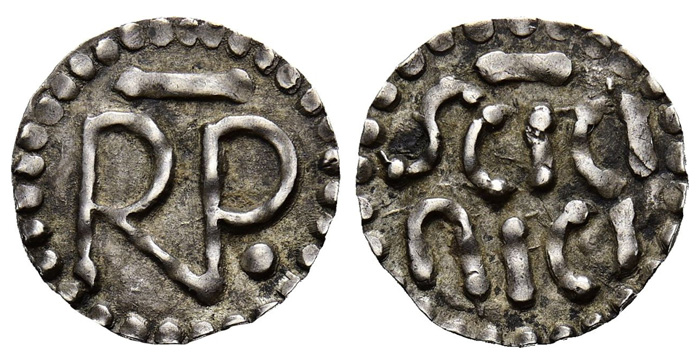
No. 1156: Augsburg. Off-metal strike in silver of the dies of the 1730
ducat. Extremely fine +. Estimate: 50 euros
No. 1158: Augsburg. Double reichstaler 1740. Very rare. About FDC. Estimate: 3,000 euros
No. 1383: Hannover. George V, 1851-1866. 1/6 taler 1859. About FDC. Estimate: 50 euros
No. 1407: Frankfurt. Kreuzer 1773. About FDC. Estimate: 20 euros
No. 1487: Königsegg-Rothenfels. Franz Hugo, 1737-1771, and his brothers. Reichstaler 1759. About FDC. Estimate: 4,000 euros
No. 1540: Nuremberg. Reichstaler 1711. Very rare. Prooflike. Estimate: 6,000 euros
No. 1688: Saxe-Saalfeld Johann Ernst VIII, 1680-1729. Reichstaler 1727, Saalfeld. Very rare. About FDC. Estimate: 6,000 euros
To order a catalogue contact Künker, Nobbenburger Straße 4a, 49076 Osnabrück; phone: +49 541 962020, fax: +49 541 9620222; or via e-mail: service@kuenker.de. You can access the auction catalogs online at www.kuenker.de. If you want to submit your bid from your computer at home, please remember to register for this service in good time.

Download the Greysheet app for access to pricing, news, events and your subscriptions.
Subscribe Now.
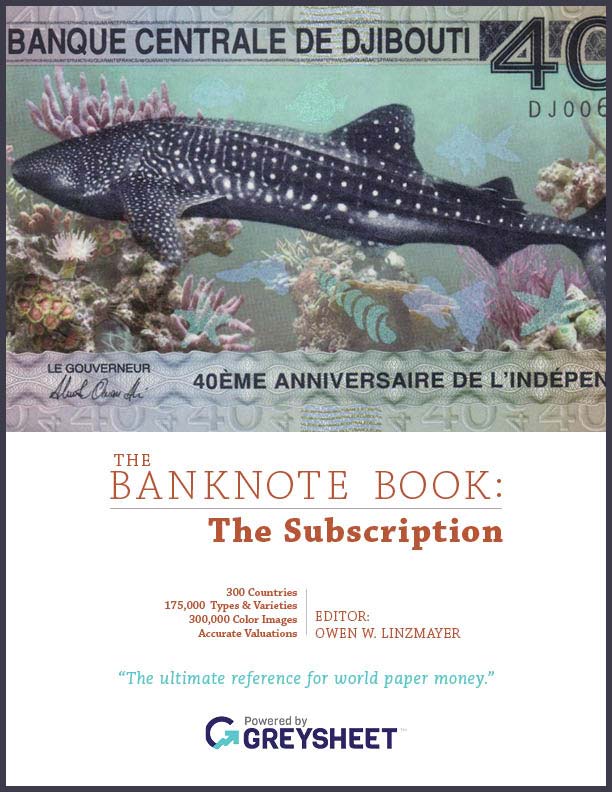
Subscribe to The Banknote Book for the industry's most respected pricing and to read more articles just like this.
Source: Fritz Rudolf Kuenker GmbH and Co. KG


